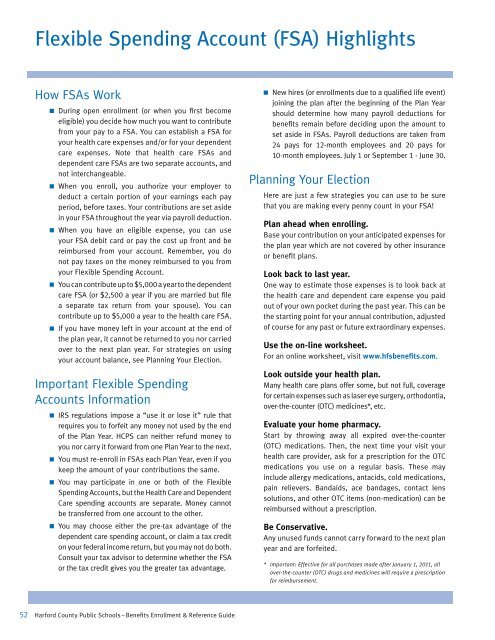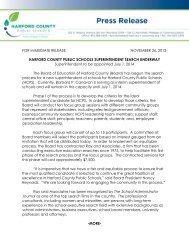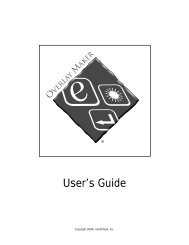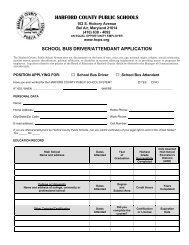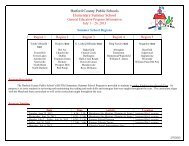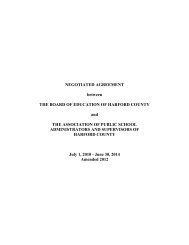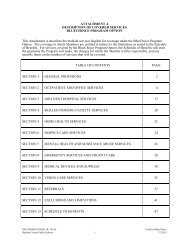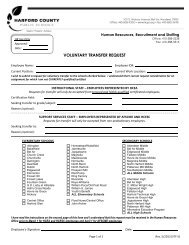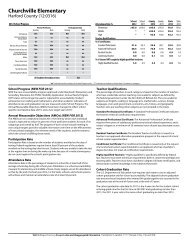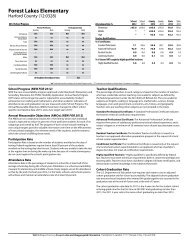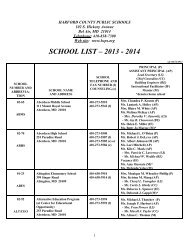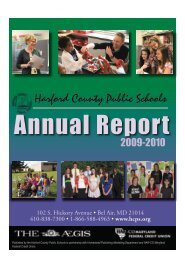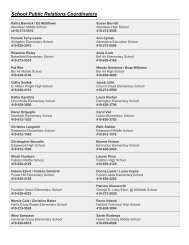Benefits Enrollment & Reference Guide - Harford County Public ...
Benefits Enrollment & Reference Guide - Harford County Public ...
Benefits Enrollment & Reference Guide - Harford County Public ...
You also want an ePaper? Increase the reach of your titles
YUMPU automatically turns print PDFs into web optimized ePapers that Google loves.
Flexible Spending Account (FSA) Highlights<br />
How FSAs Work<br />
During open enrollment (or when you first become<br />
eligible) you decide how much you want to contribute<br />
from your pay to a FSA. You can establish a FSA for<br />
your health care expenses and/or for your dependent<br />
care expenses. Note that health care FSAs and<br />
dependent care FSAs are two separate accounts, and<br />
not interchangeable.<br />
When you enroll, you authorize your employer to<br />
deduct a certain portion of your earnings each pay<br />
period, before taxes. Your contributions are set aside<br />
in your FSA throughout the year via payroll deduction.<br />
When you have an eligible expense, you can use<br />
your FSA debit card or pay the cost up front and be<br />
reimbursed from your account. Remember, you do<br />
not pay taxes on the money reimbursed to you from<br />
your Flexible Spending Account.<br />
You can contribute up to $5,000 a year to the dependent<br />
care FSA (or $2,500 a year if you are married but file<br />
a separate tax return from your spouse). You can<br />
contribute up to $5,000 a year to the health care FSA.<br />
If you have money left in your account at the end of<br />
the plan year, it cannot be returned to you nor carried<br />
over to the next plan year. For strategies on using<br />
your account balance, see Planning Your Election.<br />
Important Flexible Spending<br />
Accounts Information<br />
IRS regulations impose a “use it or lose it” rule that<br />
requires you to forfeit any money not used by the end<br />
of the Plan Year. HCPS can neither refund money to<br />
you nor carry it forward from one Plan Year to the next.<br />
You must re-enroll in FSAs each Plan Year, even if you<br />
keep the amount of your contributions the same.<br />
You may participate in one or both of the Flexible<br />
Spending Accounts, but the Health Care and Dependent<br />
Care spending accounts are separate. Money cannot<br />
be transferred from one account to the other.<br />
You may choose either the pre-tax advantage of the<br />
dependent care spending account, or claim a tax credit<br />
on your federal income return, but you may not do both.<br />
Consult your tax advisor to determine whether the FSA<br />
or the tax credit gives you the greater tax advantage.<br />
New hires (or enrollments due to a qualified life event)<br />
joining the plan after the beginning of the Plan Year<br />
should determine how many payroll deductions for<br />
benefits remain before deciding upon the amount to<br />
set aside in FSAs. Payroll deductions are taken from<br />
24 pays for 12-month employees and 20 pays for<br />
10-month employees. July 1 or September 1 - June 30.<br />
Planning Your Election<br />
Here are just a few strategies you can use to be sure<br />
that you are making every penny count in your FSA!<br />
Plan ahead when enrolling.<br />
Base your contribution on your anticipated expenses for<br />
the plan year which are not covered by other insurance<br />
or benefit plans.<br />
Look back to last year.<br />
One way to estimate those expenses is to look back at<br />
the health care and dependent care expense you paid<br />
out of your own pocket during the past year. This can be<br />
the starting point for your annual contribution, adjusted<br />
of course for any past or future extraordinary expenses.<br />
Use the on-line worksheet.<br />
For an online worksheet, visit www.hfsbenefits.com.<br />
Look outside your health plan.<br />
Many health care plans offer some, but not full, coverage<br />
for certain expenses such as laser eye surgery, orthodontia,<br />
over-the-counter (OTC) medicines*, etc.<br />
Evaluate your home pharmacy.<br />
Start by throwing away all expired over-the-counter<br />
(OTC) medications. Then, the next time your visit your<br />
health care provider, ask for a prescription for the OTC<br />
medications you use on a regular basis. These may<br />
include allergy medications, antacids, cold medications,<br />
pain relievers. Bandaids, ace bandages, contact lens<br />
solutions, and other OTC items (non-medication) can be<br />
reimbursed without a prescription.<br />
Be Conservative.<br />
Any unused funds cannot carry forward to the next plan<br />
year and are forfeited.<br />
* Important: Effective for all purchases made after January 1, 2011, all<br />
over-the-counter (OTC) drugs and medicines will require a prescription<br />
for reimbursement.<br />
52 <strong>Harford</strong> <strong>County</strong> <strong>Public</strong> Schools – <strong>Benefits</strong> <strong>Enrollment</strong> & <strong>Reference</strong> <strong>Guide</strong>


